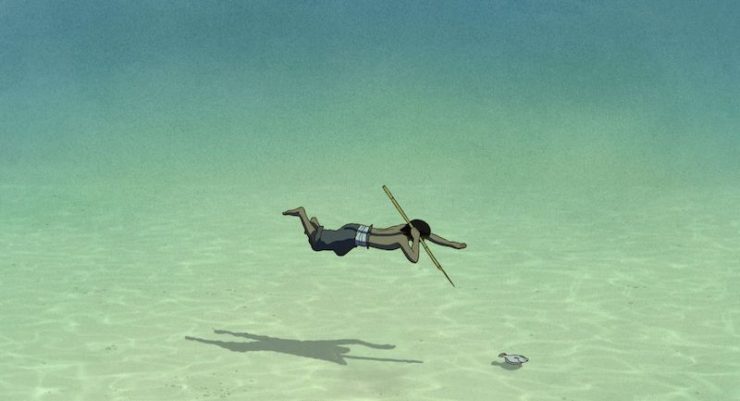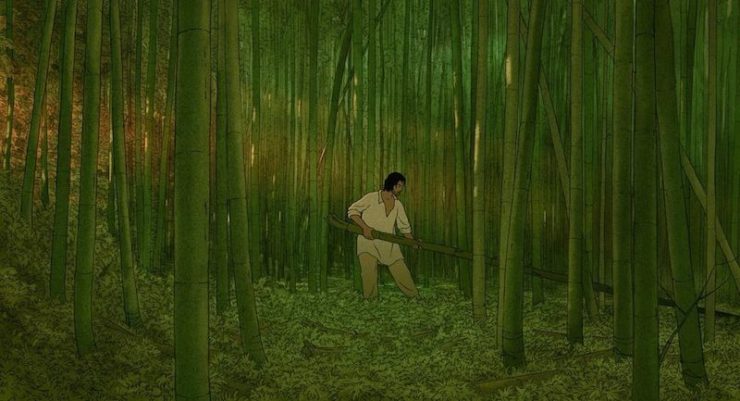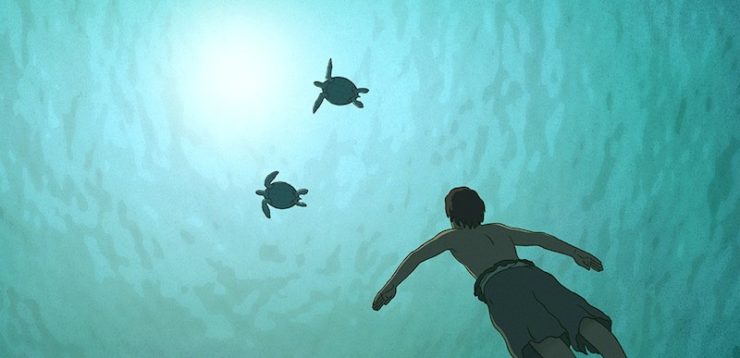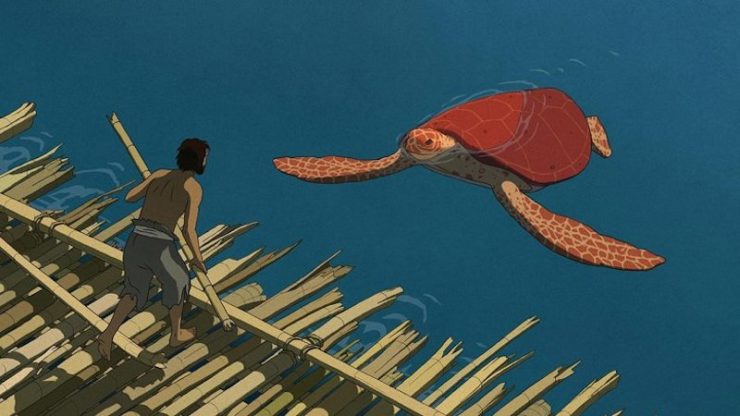Much like Kubo and The Two Strings, the new Wild Bunch/Studio Ghibli co-production The Red Turtle opens with a desperate, storm-tossed character washing up on an island. But where Kubo was an action-packed quest that also contained a meditation on trauma, mourning, and family, The Red Turtle is a stark, sparse story of survival. Basic physical survival, yes, but also the survival of the human spirit and the search for joy amid the harsh realities of life.
It is also, just to get this out of the way, gorgeous. If you love Studio Ghibli in particular, or even animation and film more generally, you owe it to yourself to seek this one out.
Light spoilers below.
This is an extremely simple tale, so saying too much about the plot will spoil it. Because of that, I’ll just tell you: our main character washes up on a deserted island. He learns that there are just enough resources for him to survive if he chooses to, but once he has his strength back he begins building rafts to try to escape. Each time, a red turtle breaks the raft and forces him back to the island. Just about the point when you think this is going to be a story about the futility of human endeavor, things take a turn for the slightly more mystical.
The first, most important thing to say is that this is not a children’s film. There were a few kids in the screening I attended, but one talked throughout to ask what was going on, and the other got quieter and quieter as the movie became darker.

The other important note is that you should definitely see it if it comes to your town, and your, say, middle school-aged and up kids should go. It’s a beautiful film, unlike anything else I’ve seen since Grave of the Fireflies in its balance of beauty and brutality.
Rather than the simple fairy tale you might expect, we get a serious look at a man surviving on an isolated island, as realistic as Cast Away or the opening of The Black Stallion. There is some levity in the form of some adorable crabs, but the theme is predominately that beauty in life is rare and hard-won. It also contains some rather adult content, and deals with death as a simple fact (again, like Grave of the Fireflies) in a way that even some adults might find a little disconcerting.

This is the first co-production for Studio Ghibli, who teamed up with French film distribution collective The Wild Bunch to support a film from a London-based Dutch animator Dudok de Wit. The genesis of the film is a bit twisty: the head of Wild Bunch visited Ghibli, where Hayao Miyazaki showed him Father and Daughter and sent him on a quest to get the director to create a feature film with them. Dudok de Wit wrote the film with César Award-winning director Pascale Ferran.
Dudok de Wit previously won an Academy Award, a BAFTA Award, and the Grand Prix at Annecy for his short film Father and Daughter. He also made The Aroma of Tea, which is drawn entirely with tea.
Like many Ghibli films, The Red Turtle is overtly about the power of nature. But rather than being tempered with the magic and whimsy typical of Miyazaki, the film commits to the idea that nature is impassive, and will crush humans and their endeavors without any intent or malice. The rushing waves, the wind in bamboos, a sky bright with stars—all become characters in the film as much as the nameless protagonist, but there is never a sense that a benevolent Totoro will drop from the sky with a hug.

The film also plays with the borders between dream and reality, as the man adjusts to his time on the island and the endless round of night and day with no other people to break it up, nothing to look forward to, no plans to be made. What is life when stripped down to the skeleton of survival? What does beauty matter, if there’s no one to share it with?
I don’t mean to paint this as a relentlessly sad film—it’s lovely and often filled with joy—but it’s about life, all of life, the storms and setbacks and tragedies as much as the triumphs. As I said above, if you love cinema you should find this film and let it wash over you.
The Red Turtle is open now in New York and Los Angeles.
Leah Schnelbach likes turtles, and occasionally Tweets.










